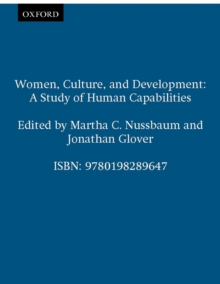
Access to Land, Rural Poverty, and Public Action Hardback
Edited by Alain (, University of California at Berkeley) de Janvry, Gustavo (, FAO, Chile) Gordillo, Elisabeth (, University of California at Berkeley) Sadoulet, Jean-Philippe (, University of Namur, Belgium) Platteau
Part of the WIDER Studies in Development Economics series
Hardback
Description
Land is a fundamental productive asset in agrarian economies.
The rules that codify access to land and the way jurisdiction over land is distributed among members of a community have a powerful influence over how efficiently land is used, the incidence of poverty, and the level of inequality in the community.
Yet we observe that much of the land in less developed countries is underutilized and/or misused from a sustainability standpoint, that lack of access to land or unfavorable terms of access remain a fundamental cause of poverty, and that unmet demands for land can be a source of political destabilization.
At the same time, there presently exist unusual opportunities to reopen the issue of access to land.
They include an increasing concern with the efficiency costs of inequality in land distribution, devolution of common property resource management to users, large scale redefinitions of property rights in the context of transition economies in Eastern and central Europe and the end of white rule in South Africa, liberalization of land markets, mounting pressure to deal with environmental issues, the proliferation of civil society organizations voicing the demands of the rural poor, and more democratic and decentralized forms of governance.
There are many channels of access to land and each of these affects how land is used.
While much attention has traditionally been given to state-led redistributive land reforms, this is only one among a variety of options, and currently not the easiest to manage politically.
Other channels include inheritance and inter-vivos transfers, intra-household and intra-community land allocations, community titling of open access resources, the distribution of common property resources and the individualization of rights, decollectivization, land markets and land market-assisted land reforms, and land rental contracts.
This book analyzes each of these channels of access to land, and recommends ways of making them more effective for poverty reduction.
Information
-
Out of stock
- Format:Hardback
- Pages:666 pages, numerous tables and figures
- Publisher:Oxford University Press
- Publication Date:29/03/2001
- Category:
- ISBN:9780199242177
Information
-
Out of stock
- Format:Hardback
- Pages:666 pages, numerous tables and figures
- Publisher:Oxford University Press
- Publication Date:29/03/2001
- Category:
- ISBN:9780199242177










